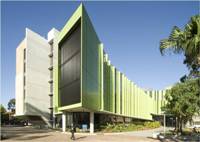Integrated Clinical Studies A - MFAC2505
Faculty: Faculty of Medicine
School: Faculty of Medicine
Course Outline: http://www.med.unsw.edu.au
Campus: Sydney
Career: Undergraduate
Units of Credit: 24
EFTSL: 0.50000 (more info)
Indicative Contact Hours per Week: 20
CSS Contribution Charge: 3 (more info)
Tuition Fee: See Tuition Fee Schedule
Further Information: See Class Timetable
View course information for previous years.
Description
Objectives of the Society and Health Term: - By using authentic clinical and practical experiences in the community as the basis for learning, students will build upon their understanding of the relationship between the health of an individual or population and the social and physical environment. In addition, students will develop understandings of the population health aspects of relevant illnesses and the role of other health professionals and community-based services in prevention of illness and addressing the social and environmental determinants of health. Students will also extend their capabilities in communication with, and assessment of, individual patients and population groups with specific health issues. Typical environments and/or experiences will include sexual health and infectious disease services, services for particular population groups such as indigenous people, refugees, homeless people, community specialist services such as drug and alcohol, diabetes, infectious disease, respiratory, or public health services that focus on health care based in the community and preventative approaches. Clinical experiences will be augmented by a range of tutorials, laboratory classes, and face-to-face and/or electronic resources covering aspects of public health, community medicine, pathology, infectious disease and pharmacology.
Objectives of Adult Health 1 Term: - By using authentic clinical or practical experiences as the basis for learning, students will build upon their understanding of the internal and external mechanisms that maintain health or lead to disease. In addition, students will develop understandings of the clinical aspects of relevant illnesses, whilst extending their capabilities in communication with, and physical examination of, patients with specified health issues. Major organ systems such as the cardiovascular, gastrointestinal and respiratory systems, will be studied in a clinical context covering acute, chronic and complex presentations, supported by teaching in the basic and social sciences.
Objectives of the Oncology Term: - By using authentic clinical or practical experiences as the basis for learning, students will build upon their understanding of the specific health issues faced by patients with cancer. In addition, students will develop understandings of the clinical aspects of oncology, whilst extending their capabilities in communication with, and physical examination of, patients with specified health issues. Typical clinical issues encountered will include simple and complex co-morbidity problems in common cancer medicine, palliative care and terminal illness.
For Integrated Clinical Studies A, a case-based teaching methodology is employed to link acquisition of clinical and public health capabilities with the learning of mechanisms and principles underlying health and illness. Approximately 60% of available time will be spent in clinical and community environments associated with the Faculty of Medicine, in which students will encounter patients or health issues relevant to the domain themes. These experiences will be augmented by a range of tutorials, laboratory classes, and face-to-face and/or electronic resources.
Assessment will include submission of group projects and assignment reports, demonstrating integration/ correlation of prior and current learning with linkage to basic biomedical sciences; medical imaging and diagnostic tests; ethics; or population health issues. In addition, the student's clinical performance during the module will be graded as satisfactory/unsatisfactory.









